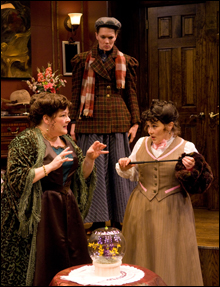Gamm’s Boston Marriage is a ticklish toss-off
By BILL RODRIGUEZ | March 25, 2008

FACING OFF: Overly, Carpenter, and Kim. |
The 19th-century practice of the lesbian “Boston marriage” was packed with enough human urgency and necessary social hypocrisy to supply any number of plays — dramas, comedies, hat-passing street improvs. David Mamet’s farcical take with his 1999 Boston Marriage provides plenty of smirks along the way. But it’s mainly a series of reminders that so much more could be done with the opportunity, despite the entertaining, exhausting efforts by the actors and director Judith Swift to keep us laughing. The Sandra Feinstein-Gamm Theatre production continues through April 13.
Mamet is, of course, the Obi Wan Kenobi of playwrights who specialize in tough-talking testosterone-poisoning studies, though he has tried his hand at drawing room conversations, adapting several plays by Chekhov. With Boston Marriage, he has created a couple of female reprobates glorying in their dreadful behavior, karmic balance for his unforgettably misogynistic men.
We have just three characters in this drawing room where all the action takes place, three women in a societal pressure cooker. It’s the home of Anna (Wendy Overly). The room has just been done over in chintz, which she mistakenly thought was preferred by Claire (Casey Seymour Kim), occasional visitor and former lover. But Claire has a future former lover of her own in mind and would like to use the apartment for her seduction.
No, the third character is not that innocent, offstage potential victim, but rather the maid, Catherine (Karen Carpenter). In such a farce we need a hapless observer, as wide-eyed as possible, to stand in for us and provide surrogate double takes. Carpenter does a wonderful job, at first trembling in her shoes at being rudely treated and ignored — a running joke is Anna’s ignoring her Scots brogue and blaming her and her people for the potato famine because they remained ignorant of proper nitrogen soil replenishment. Carpenter is always a delicious comic presence here, whether she is mutely reacting to the madness around her or, eventually, asserting herself when she has her own distracting problem to deal with.
The absence of Claire’s unnamed ingénue is especially ironic in a play by Mamet, who has made a dramaturgical fetish of directing actors to establish character through actions rather than feelings. But we can only get to know her and other unseen characters — such as Anna’s rent- and stipend-paying “protector” — through the catty remarks of these two women. (This telling rather than showing culminates toward the end in an elaborate scenario the two friends describe as they make plans to snooker the protector and the sweet young thing, pretending to be fortune teller. The drawn-out scene merely reminds us how funny it might be if all the described participants were actually enacting it.)
The laughs in this play are numerous but they are occasional bonbons, not as nourishing as the developing plotline of a normal farcical feast. When Claire remarks on the size of the emerald pendant in Anna’s necklace, a recent gift from her protector, she banters back, “I wear it, should I be summoned on the instant, to choke a horse.” (My favorite of Anna’s is her snide aside: “Have you taken a vow of arrogance?”)
And that’s another thing. The witty Disraeli-before-Parliament exchanges of the two upper-crust women are as fun to hear as they were for the playwright to write, but this arch diction is sometimes out of character for the women. There are moments, after all, when they are not trying to impress each other. It’s in social gatherings of the period, not intimate tête-à-têtes, where such one-upping banter might plausibly continue unabated — another reason why more characters would be helpful here. And since bon mots rather than characterization are the offering, some shifts in tone don’t fit some moments. While Claire gets plenty of witticisms to spout, she also has to pipe up with “You have fucked my life into a cocked hat!” simply for shock effect.
Director Swift, known for her attentiveness with one-on-one character relationships, has done what she could with a play that doesn’t much care about the central friendship. As for Overly and Kim, they have great fun playing conversational ping-pong. Anna is the grand dame with the haughty, sweeping pronouncements, which she delivers in properly supercilious style. Claire always has a wisecracking, mugging response, just the sort of task Kim is so good at.
Boston Marriage is certainly worth seeing for these performances. Just don’t expect Mamet at his best in this trifling toss-off.
 Topics
Topics:
Theater
, Casey Seymour Kim
, David Mamet
, Karen Carpenter
, More  , Casey Seymour Kim
, David Mamet
, Karen Carpenter
, Wendy Overly
, Judith Swift
, Theater
, Theatrical Plays
, Entertainment
, Performing Arts
, Obi-Wan Kenobi
, Less
, Casey Seymour Kim
, David Mamet
, Karen Carpenter
, Wendy Overly
, Judith Swift
, Theater
, Theatrical Plays
, Entertainment
, Performing Arts
, Obi-Wan Kenobi
, Less 